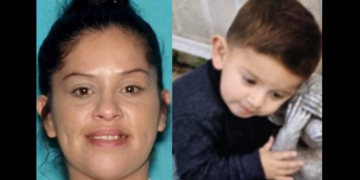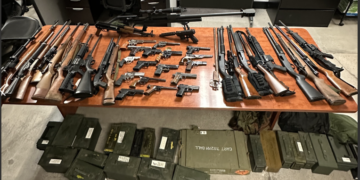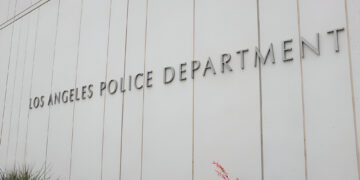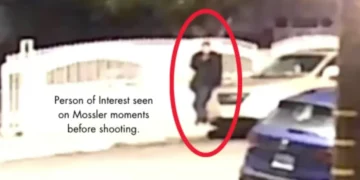LOS ANGELES, CA – Months after pro-Palestinian protests and counter-protests erupted on the UCLA campus, the university continues to face backlash over its response to the events, including the loss of a multi-million-dollar donation from a long-time donor and alumnus. Newly released public records shed light on the decision-making process and internal pressures that unfolded during the protests in April and May 2024.
Protests and Escalated Tensions
The protests began on April 28, 2024, as part of a nationwide wave of demonstrations over the Israel-Palestine conflict, quickly escalating into physical altercations between pro-Palestinian protesters and counter-demonstrators.
Emails obtained through a public records request filed on April 30 reveal how UCLA officials, including Chancellor Gene Block, struggled to balance the right to peaceful protest with growing concerns about campus safety and the disruption of university operations.
Internal communications highlight efforts to maintain transparency while addressing mounting criticism from faculty, students, and parents. Vice Chancellor Mary Osako wrote to senior leadership, emphasizing the need for a clear communication strategy rooted in transparency and humanity. In response, Chancellor Block affirmed UCLA’s commitment to “Bruin values” but warned against activism that could harm the university’s academic mission.
The situation escalated further on April 30, when UCLA declared the encampment in Royce Quad unauthorized. Chancellor Block described some protest tactics as “shocking and shameful”, adding that UCLA supported peaceful demonstration but not behavior that endangered campus safety.
Administrative Decisions Under Fire
Records show that administrators faced intense pressure from all sides. Faculty members expressed concerns about the potential for violence, with some comparing the situation to Kent State, where protests turned deadly in 1970. Parents and alumni sent emails urging the university to restore order, while others accused UCLA of tolerating hate speech and anti-Semitism.
One email read, “Shameful! Take control of your university or let the police do it. Never again is now.” Another countered, “Your inability to find a peaceful way through this makes you abysmally unqualified for your job.”
As tensions rose, UCLA’s decision to move classes online drew sharp criticism. Some described the move as necessary to ensure student safety, while others viewed it as a failure to stand firm against disruption.
In the wake of the protests, UCLA faced financial consequences as well. On April 29, an alumnus and donor informed the university that they had removed UCLA from their family trust, citing dissatisfaction with the administration’s handling of the situation. The donation, valued in the millions of dollars, was formally revoked.
The donor later confirmed their decision, stating, “UCLA has now lost our multi-million-dollar bequest.”
Other donors expressed similar frustrations, with some threatening to withhold future contributions unless UCLA implemented policy reforms to prevent such disruptions in the future.
While some faculty members defended Chancellor Block’s approach, others expressed outrage over what they described as moral cowardice and failed leadership.
In a May 2 letter, Judea Pearl, a prominent UCLA educator, praised Block for refusing to yield to the protesters’ demands, citing the support of over 400 professors. Conversely, several faculty emails called the administration’s response weak and ineffective, with one email stating, “I write as a deeply troubled and angry faculty member who is at the moment ashamed to be associated with UCLA.”
Campus Security and Gene Block’s Retirement
By early May, UCLA had declared the encampments illegal, prompting a police intervention that resulted in an overnight dismantling of the protest site. The response included violent clashes with counter-protesters, raising further questions about UCLA’s security planning.
The backlash intensified after an independent audit, released in November, identified failures in performance, safety protocols, and communication systems. The report urged UCLA to implement reforms to address administrative shortcomings and restore campus safety.
In December, UCLA’s Police Chief, who had faced criticism for his handling of the protests, resigned. The interim police chief vowed to rebuild trust through accountability, integrity, and service.
The fallout from the protests coincided with Chancellor Gene Block’s retirement, which had already been announced before the demonstrations. Block, who led UCLA for nearly two decades, stepped down amid criticism but also received praise for his commitment to academic values during turbulent times.
UCLA released a statement following Block’s departure, highlighting his role in transforming UCLA into one of the world’s top research institutions and expressing confidence that the search for his successor would attract top candidates.
Despite releasing 455 pages of documents related to the protests in response to a public records request, UCLA withheld portions of correspondence, citing legal protections for internal discussions.
Officials defended the redactions, stating that certain records were exempt from release because the public interest in non-disclosure outweighed the interest in transparency. Critics, however, argued that the lack of full disclosure undermined public trust and left unanswered questions about the university’s decision-making process.
Future Challenges and Rebuilding Trust
As UCLA continues to grapple with the fallout, the university faces pressure to restore confidence among students, faculty, and donors while addressing concerns about campus safety, free speech, and governance.
The events of April and May 2024 have left a lasting impact, raising broader debates about academic freedom, protest rights, and the role of universities in navigating political conflicts.
In the coming months, UCLA is expected to implement recommendations from the independent audit while conducting a national search for its next chancellor. The outcome of these efforts may determine whether the university can move forward from the controversies that defined its recent past.


























